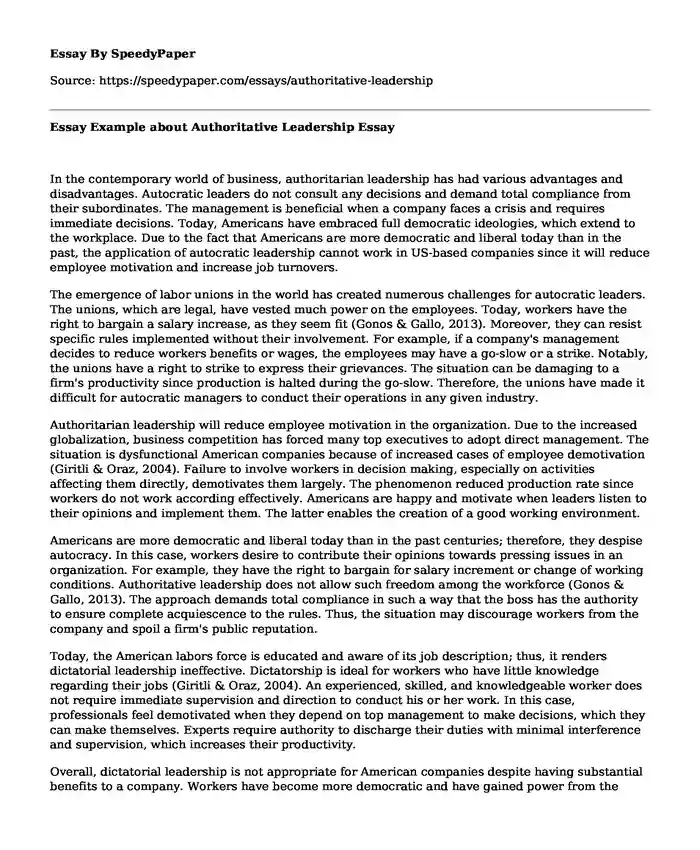
| Type of paper: | Essay |
| Categories: | Leadership style |
| Pages: | 3 |
| Wordcount: | 608 words |
In the contemporary world of business, authoritarian leadership has had various advantages and disadvantages. Autocratic leaders do not consult any decisions and demand total compliance from their subordinates. The management is beneficial when a company faces a crisis and requires immediate decisions. Today, Americans have embraced full democratic ideologies, which extend to the workplace. Due to the fact that Americans are more democratic and liberal today than in the past, the application of autocratic leadership cannot work in US-based companies since it will reduce employee motivation and increase job turnovers.
The emergence of labor unions in the world has created numerous challenges for autocratic leaders. The unions, which are legal, have vested much power on the employees. Today, workers have the right to bargain a salary increase, as they seem fit (Gonos & Gallo, 2013). Moreover, they can resist specific rules implemented without their involvement. For example, if a company's management decides to reduce workers benefits or wages, the employees may have a go-slow or a strike. Notably, the unions have a right to strike to express their grievances. The situation can be damaging to a firm's productivity since production is halted during the go-slow. Therefore, the unions have made it difficult for autocratic managers to conduct their operations in any given industry.
Authoritarian leadership will reduce employee motivation in the organization. Due to the increased globalization, business competition has forced many top executives to adopt direct management. The situation is dysfunctional American companies because of increased cases of employee demotivation (Giritli & Oraz, 2004). Failure to involve workers in decision making, especially on activities affecting them directly, demotivates them largely. The phenomenon reduced production rate since workers do not work according effectively. Americans are happy and motivate when leaders listen to their opinions and implement them. The latter enables the creation of a good working environment.
Americans are more democratic and liberal today than in the past centuries; therefore, they despise autocracy. In this case, workers desire to contribute their opinions towards pressing issues in an organization. For example, they have the right to bargain for salary increment or change of working conditions. Authoritative leadership does not allow such freedom among the workforce (Gonos & Gallo, 2013). The approach demands total compliance in such a way that the boss has the authority to ensure complete acquiescence to the rules. Thus, the situation may discourage workers from the company and spoil a firm's public reputation.
Today, the American labors force is educated and aware of its job description; thus, it renders dictatorial leadership ineffective. Dictatorship is ideal for workers who have little knowledge regarding their jobs (Giritli & Oraz, 2004). An experienced, skilled, and knowledgeable worker does not require immediate supervision and direction to conduct his or her work. In this case, professionals feel demotivated when they depend on top management to make decisions, which they can make themselves. Experts require authority to discharge their duties with minimal interference and supervision, which increases their productivity.
Overall, dictatorial leadership is not appropriate for American companies despite having substantial benefits to a company. Workers have become more democratic and have gained power from the existence of labor unions. It may lead to a company having a high job turnover rate. Demotivated employees may find it convenient to end contracts and seek greener pastures elsewhere. Similarly, conflict may derail a firm's efficiency. It is incumbent on the management to utilize an approach that is convenient with all employees.
References
Giritli, H., & Oraz, G. T. (2004). Leadership styles: some evidence from the Turkish construction industry. Construction Management and Economics, 22(3), 253-262.
Gonos, J., & Gallo, P. (2013). Model for leadership style evaluation. Management: Journal of Contemporary Management Issues, 18(2), 157-168.
Cite this page
Essay Example about Authoritative Leadership. (2022, Sep 28). Retrieved from https://speedypaper.net/essays/authoritative-leadership
Request Removal
If you are the original author of this essay and no longer wish to have it published on the SpeedyPaper website, please click below to request its removal:
- Literature Review Essay Sample on BOMB: The Race to Build and Steal
- Essay Example on the Symptoms of Metastatic Cancer
- "The Exchange" by Alicia Ostriker, Poem Analysis in a Free Essay
- Essay Sample on the Strategies Used to Resolve Conflicts and Wars Historically
- JOIN and UNION Statements, Free Essay on Database Usage
- Essay Example on VoyagerVR: Inspiring Educational VR Experiences for a New Generation
- Free Essay Example. Abstract Topics
Popular categories




